Symposium
Who Speaks?
Virtual Symposium on Artificial Intelligence, Language, and Democracy
November 09, 2020; 11:00 – 18:00Youtube Channel Royal Academy of Art (KABK)
A thriving democracy is based on informed debate and involves a wide range of language-based interactions. In fact, the term parliament itself comes from the French word parler (to talk / speak). Deliberation and debate in both public and private spaces are at the core of both democratic processes and personal liberties. Voting is based on language, whether on the physical ballot, during the election campaign or simply by formulating voting and election laws. Language permits ideas to circulate freely, and is part of the very DNA of political processes.
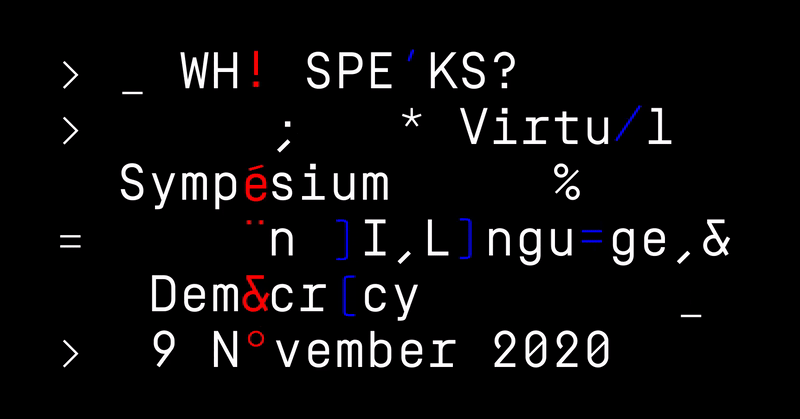
Who Speaks? is a project collaboration between the Non Linear Narrative Master’s programme of the Royal Academy of Art, The Hague, University College London and Camberwell College of Arts (CCW / University of the Arts London) with the Analysis and Research Department (DAO) of the Dutch Parliament. It manifests itself in the form of a one-day international symposium and a semester-long study programme that investigates how artificial intelligence influences democracy by means of language. During its course, Who Speaks? welcomes notable individuals from the digital rights movement, cyberlaw, political philosophy and investigative journalism in order to understand the decision-making processes behind artificial intelligence and machine learning.
The virtual symposium is organised as a Live broadcast via Youtube which brings together academic peers and Dutch policy makers for joint knowledge exchange and discussion on who has actually the final say in an AI driven democracy. Major issues addressed during three panel discussions, focus on algorithmic bias, surveillance technologies, fake news, online privacy rights, speech and text generation, search engine censoring and post-feminist computing. The panels have been organised as free–flowing dialogues.
Speakers
Evelyn Austin, Bits of Freedom, Amsterdam
André Brock, School of Literature, Media and Communication, Atlanta
Ezekiel Dixon-Román, University of Pennsylvania
Bernard Keenan, Birkbeck, University of London
Jack Poulson, Tech Inquiry, Toronto
Helen Pritchard, Goldsmiths, University of London
Richard Rogers, University of Amsterdam
Location details
On 9 November 2020 the symposium will take place here. Admission to the event is free, but you are kindly requested to register via www.kabk.nl.
Who Speaks? is an initiative by Niels Schrader, information designer and co-head Graphic Design and Non Linear Narrative at the Royal Academy of Art, The Hague, Dr Ramon Amaro, lecturer and researcher in the field of machine learning at University College London (formerly Goldsmiths), and Dr Sheena Calvert, lecturer in the areas of philosophy of language, politics and ethics in creative practice at Camberwell College of Arts (CCW / University of the Arts London). In 2019 they began collaborating together under the name Queer Computing Consortium (QCC). Who Speaks? is the first in a series of events and activities under development by the QCC.
Public event
Fare niente da qualcosa
Improvvisare, pubblicare, resistere!
June 28, 2019; 15:30 – 17:30Controra - Oreri Iniziativa Editoriale
Making Nothing Out of Something: Improvising writing and publishing in relation to practices of resistance is the 2018–2019 Open! Coop Academy study group, part of DAI Roaming Academy. After a year of study and intensive gatherings in Arnhem, Epen, St. Erme, Cagliari, Dessau and Berlin, we will share our inquiries and makings with the public.

How can the collective task of writing enhance the singularity of our individual voices, as a social space where political desires can be improvised, embodied and shared? Improvisation as the core of a language for a community yet to come. A community of resistant bodies that perpetually claims its geographical infinitude, its unwritten histories, oppressed traditions, and bastard languages.
As roaming, gentrifying, squatting, culturally entangled, privileged yet marginalised members of this study group, we take inspiration from activist movements, both historically and contemporary, to self-publish alternatives to the current techno capitalist cultural hegemony. How do we define our tools, methods and ethos to act out a queer possibility, deliberate on our current dislocated locality and post-colonial condition? How can we produce objects that operate as comrades and set the stage for a discussion that can narrate our protests? With Fare niente da qualcosa: improvvisare, pubblicare, resistere! we invite you to join us for a gathering, performance, reading, conversation and exhibition in which we aim to reflect and embody improvisation as ‘a movement, a dehiscence, a quickening’ (Fred Moten, The Universal Machine, Duke University Press, 2018) as a generative yet relational tool for a non-fascist future.
Study group Making Nothing Out of Something: Improvising writing and publishing in relation to practices of resistance
Students: Sara Benaglia, Saskia Burggraaf, Dorothy Hunter, Flavia Palladino, Nine Postma, Wilf Speller & tutors: Jorinde Seijdel, Florian Göttke, Werker Collective (Rogier Delfos & Marc Roig Blesa). Partner: Open!
Location details
The event starts at 15:30 h on Friday, 28 June 2019 at Controra, Cagliari. Admission is free.
Piazza Dettori, 3, 09124 Cagliari CA, Italy
Conference
Urgent Publishing
New Strategies in Post-truth Times
May 15, 2019 19:00 – May 17, 2019 22:00ArtEZ University of the Arts, Arnhem
Institute of Network Cultures, ArtEZ University of the Arts and Willem de Kooning Academy are happy to invite you to Urgent Publishing, a conference with presentations and workshops about publishing strategies in post-truth times.
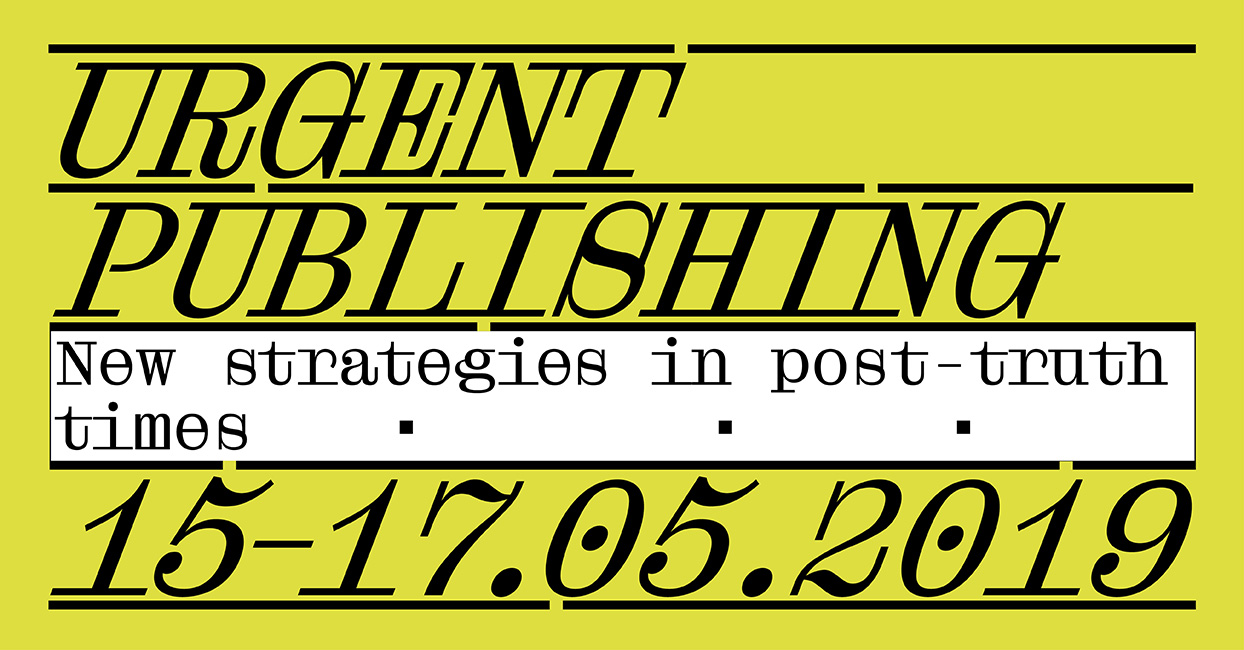
The 21st century has witnessed the liberation of publishing practices. Digital technologies have brought the printing press to the masses. Who gets to publish and when, the medium used and the channels through which information is consumed have all changed drastically. An ever accelerating development of emergent technologies has led to a wide array of emergent publishing practices, be it in the form of longreads, vlogs, zines, collaborative platforms or print-on-demand – all the while leaving the status of and love for paper books intact. A plethora of tools, applications, infrastructures, models, and hacks thus makes many futures of publishing possible. How to realize sustainable, high-quality alternatives within this domain of post-digital publishing?
Liberation comes with its downsides: while the availability of publishing technologies has helped bring different voices onto the stage, connect new communities and identify hegemonic intersections of power, they have also played a role in bringing about what is known as the ‘post-truth era’. Critical interventions have been somewhat self-referential and concentrated on the needs and demands of people and communities engaged in the history of art or avantgarde publishing. In the meantime, the scale and scope of once emergent publishing practices have exploded, leaving a disenchanted public to scavenge the rubble of breaking fake news stories, information pollution and broken links. Speed and availability of publications may have increased, but the quality of the information presented and of its containers lags behind.
What is needed is a break with the old, closed pre-digital era of gatekeepers or high entry costs. Publishers, writers, researchers, designers and developers need new strategies for urgent publishing. A critical set of discourses, practices and productions to intervene in the public debate with high-quality information that can be issued in a timely manner and that will reach the desired audiences. The development of such a toolbox of strategies has been the focus of diverse critical cultures that have interacted and experimented with publishing in the last two decades. Concentrated efforts directed towards furthering these practices within the context of the current information age will open up robust futures for a publishing domain that remains forever emergent – and urgent.
How can designers, developers, artists, writers and publishers intervene in the public debate and counter misinformation in a meaningful and relevant way? What are new publishing strategies for our current media landscape? How to design for urgency without succumbing to an accelerated hype cycle? Join us for three days of discussions, explorations and experiments at Urgent Publishing.
Speakers
Pre-Conference Night with Clara Balaguer, Padmini Ray Murray, Morten Paul, and Nikola Richter, moderated by Florian Cramer. Conference with Janneke Adema & Gary Hall, Axel Andersson, Evelyn Austin, Clara Balaguer, Silvia dal Dosso & Noel David Nicolaus, Isabel Löfgren, and Lídia Pereira, moderated by Miriam Rasch and Inte Gloerich.
Location details
The event will start with a Pre-Conference Night on 15 May 2019 at Academische Club, Amsterdam. The Conference with presentations will take place the day after on 16 May 2019 at ArtEZ University for the Arts, Arnhem and will be followed by a series of workshops on 17 May 2019 at ArtEZ University for the Arts and Motel Spatie, Arnhem. More information and registration: networkcultures.org
Tickets
Admission: free, but registration is required at networkcultures.org
Academische Club, Oudezijds Achterburgwal 235, 1012 DL Amsterdam, the Netherlands; ArtEZ University of the Arts, Utrechtsestraat 85, 6811 LW Arnhem, the Netherlands; Motel Spatie, Hisveltplein 21–35, 6826 EM Arnhem, the Netherlands.
Conference-Festival
Take a Walk on the Wild Side
Fabulating Alternative Imaginaries in Art and Life
March 27, 2019 10:00 – March 30, 2019 17:00Stedelijk Museum, Amsterdam
Four-days conference-festival organized by Studium Generale Rietveld Academie with guest curators Kunstverein / Maxine Kopsa, Hypatia Vourloumis, Daniela Rosner and Tavia Nyong’o, who each inaugurate a discursive and performative study day with practices of critical fabulation in art, design and theory. The conference-festival is an invitation to ‘take a walk on the wild side’, and to regard fabulation – in the sense of fabricating the real, world-making or speculative fiction – as an artistic, social and political capacity. By making use of the fictional, critical fabulation in art, literature or theory can produce or uncover visions, histories and stories that are radically discontinuous from official and dominant narratives about our lives and living together. By bringing the unthinkable and silenced into representation, fabulation can be a way or methodology to enter the wild side: a space for what lies beyond current systems and structures of rule.
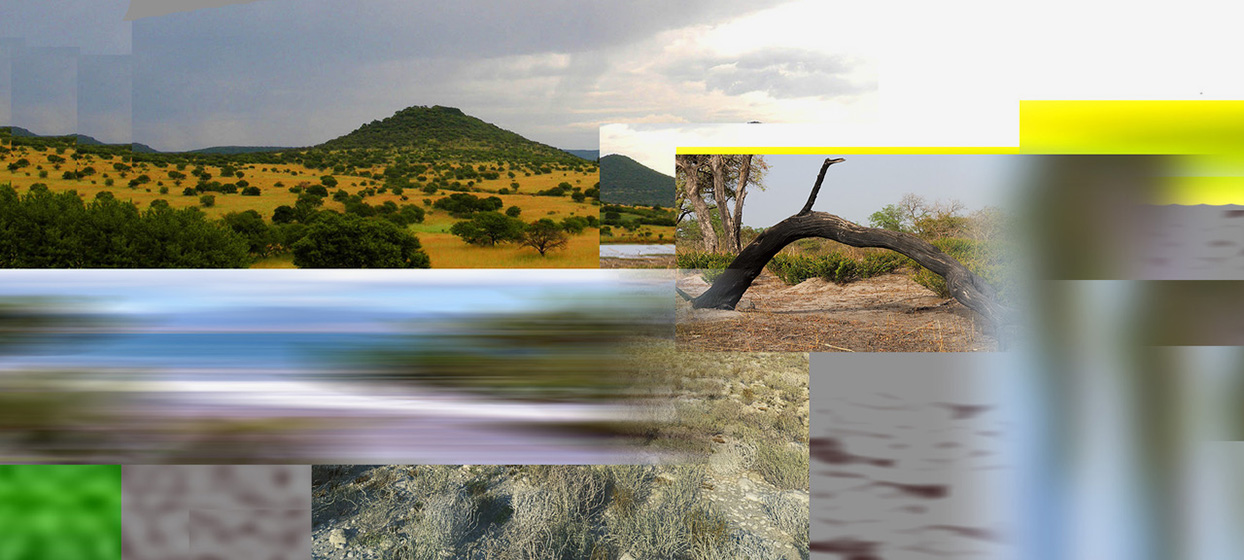
March 27, 2019: Kunstverein, Take a Deep Breath
Take this day as a remedy, a retreat, a parachute drop out of frippery and pseudo-fame trappings. Take this day as a day of experiences, involvements, encounters, occurrences, friendship, digital avoidances, first person accounts, parallel perceptions, alternative languages and song. In waves and ribbons, and transitions, accompanied by silences and lights. A stroll with Alice Chauchat and Raimundas Malašauskas. Listening to time travel with Rosalind Nashashibi. Encountering ‘a misdirected weeping angel within a close proximity communication method’ hosted by Austin Redman.Topped emotionally with a ballad song to you by Mark Buckeridge. Participants: Mark Buckeridge, Alice Chauchat, Isabel Lewis, Raimundas Malašauskas, Rosalind Nashashibi, Austin Redman.
March 28, 2019: Hypatia Vourloumis, Excess Swarm (Wild in the Wild)
The presentations and performances on this day of study will delve into the aesthetic practices and unruly visons of queer diaspora, sensual excess and brown jouissance, the poetics of emergent aberrations, the magic of science and the intertwining of neurodiverse sensory circuits, futurisms and distorted constellations, the love song, anticolonial time, and the dancing of things and nothingness. Participants: Nwando Ebizie, Gayatri Gopinath, Malak Helmy (with Janine Armin), Monsur Mansoor, Amber Jamilla Musser, Sandra Ruiz, Jackie Wang.
March 29, 2019: Daniela Rosner, Who Gets to Future?
Rather than position the past as a stable precursor to the present, or view the future as a progressive march to the finish, the artists, scholars and activists in this session materialize stories to challenge teleologies of innovation, reworking who and what are made to matter. Across lectures, screenings and performances they weave feminist speculation into critical rereadings, drawing out a ‘techno-affect of attunement’, curtailing relations of domination. Participants: Shaowen Bardzell, Åsa Ståhl / Kristina Lindström, Priscilla Telmon / Vincent Moon, Sarah Sharma.
March 30, 2019: Tavia Nyong’o, Dark as the Door to a Dream
This study day explores the aesthetics practices of Afro-surrealism through a kaleidoscope of feminist, queer and trans* optics. We seek to decolonize surrealism from the Eurocentric frame of art history and colonial anthropology, and look expansively at black (and blak) art forms that take on the fantastical, the mythical and the otherworldly. Resisting institutional and intellectual tendencies to separate blackness and indigeneity, we wish to reconnect Afro-surrealism to a planet-spanning archipelago of freedom dreams, fugitive escapades and dissident genders. We are interested in how the often obscene hallucinatory reality of blak (and black) life can inform art in form and content, and help us re-envision what we mean by freedom and selfhood. Participants: Tina Campt, Jayna Brown, Luke Willis Thompson, Naima Ramos Chapman, Tiona Nekkia McCLodden.
Speakers
Shaowen Bardzell, Jayna Brown, Mark Buckeridge, Tina Campt, Naima Ramos Chapman, Alice Chauchat, Nwando Ebizie, Gayatri Gopinath, Malak Helmy and Janine Armin, Maxine Kopsa, Isabel Lewis, Raimundas Malašauskas, Monsur Mansoor, Tiona Nekkia McCLodden, Amber Jamilla Musser, Rosalind Nashashibi, Tavia Nyong'o, Austin Redman, Daniela Rosner, Sandra Ruiz, Åsa Ståhl / Kristina Lindström, Priscilla Telmon / Vincent Moon, Sarah Sharma, Luke Willis Thompson, Hypatia Vouloumis, Jackie Wang,
Tickets
Guests from outside the Rietveld are welcome to purchase a day ticket from the Stedelijk Museum website: www.stedelijk.nl, or directly at the Stedelijk Museum counters during the conference (limited seats available) Prices: EUR 3 (+ museum entrance fee) / EUR 3 (+ Museumkaart); takeawalkonthewildside.rietveldacademie.nl.
Stedelijk Museum Amsterdam, Museumplein 10, 1071 DJ Amsterdam, the Netherlands, www.stedelijk.nl.
Symposium
Fault Lines
December 14, 2018; 10:00 – 20:00Royal Academy of Art, The Hague
Fault Lines is a one-day symposium that will explore the interstitial positioning and generative potential of design research as the borders of disciplines shift, while presenting an array of research projects that map and interpret the traces of design’s complicity in climate change.
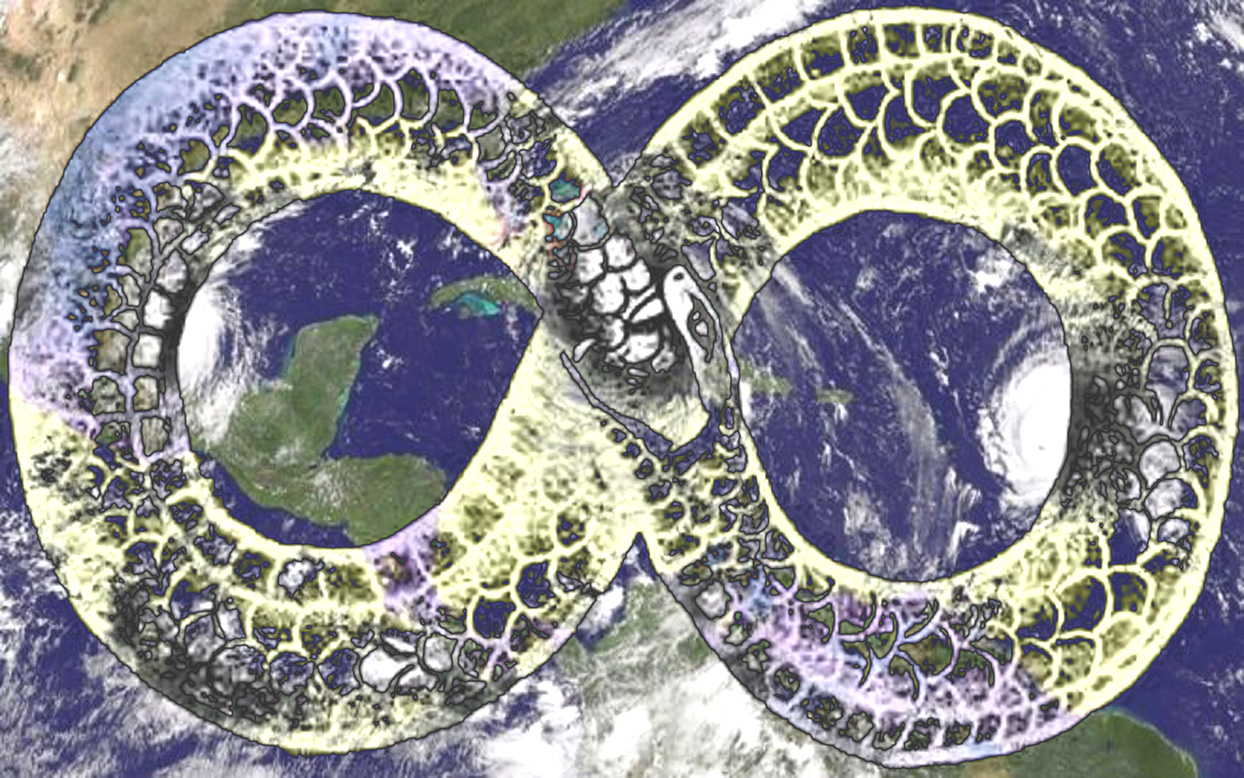
How does contemporary design research inhabit the fissures between disciplinary realms and negotiate the discontinuities between them? Are there particular qualities and capacities of design-specific tools and methods and what do they allow for? And how can the insights that arise from experimental research inquiries make a significant contribution to design practice, to education, and to knowledge?
This one-day symposium aims to surface research activity by members of the teaching community at Royal Academy of Art (KABK) and Leiden University. It will feature some of the projects being developed through the current KABK research groups, alongside contributions from invited keynote speakers, with a particular emphasis on practice-led research that uses design either as its subject matter or means for investigation. The symposium seeks to identify approaches, methods and tools with broader application to the growing design research culture at KABK and beyond.
Speakers
Featuring keynote lectures by Marjanne van Helvert (Dirty Design), Anab Jain (Superflux), Richard Rogers (Digital Methods Initiative, University of Amsterdam) and Susan Schuppli (Centre for Research Architecture, Goldsmiths). With presentations of research in progress by KABK and Leiden University teaching and research staff members Lauren Alexander, Rachel Bacon, Anja Groten, Eric Kluitenberg, Niels Schrader, Füsun Türetken, Rosa te Velde and Donald Weber. Hosted and moderated by Alice Twemlow, Design Lector at the KABK and Associate Professor at Leiden University’s Academy of Creative and Performing Arts (ACPA).
Registration
For more information and to register please visit the symposium event page. Due to limited seating, registration is on a first-come, first-serve basis. For other inquiries: l.betting@kabk.nl.
Lectorate Design
The Lectorate Design, headed by Dr. Alice Twemlow, aims to nurture a robust design-focused research culture within the KABK and via the channels that connect KABK and Leiden University. Launched in September 2017, the lectorate is centred on a research project titled Design and the Deep Future, which explores the relationship between design and geological time.
Royal Academy of Art (KABK), Prinsessegracht 4, 2514 AN The Hague, the Netherlands, www.kabk.nl.
Public event
Topologies of Touch
COOP Summit 2018
June 01, 2018; 15:00 – 18:00 Circuits & Currents, Athens
For the public presentation of its 2018–2019 trajectory, Open! Coop Academy Topologies of Touch study group, part of DAI Roaming Academy, will be based in Athens. After a year of study and intensive gatherings in Arnhem, Cologne, Heemskerk, Oldebroek, Thessaloniki, Athens, Epen and Barcelona, we will share our inquiries with the public.
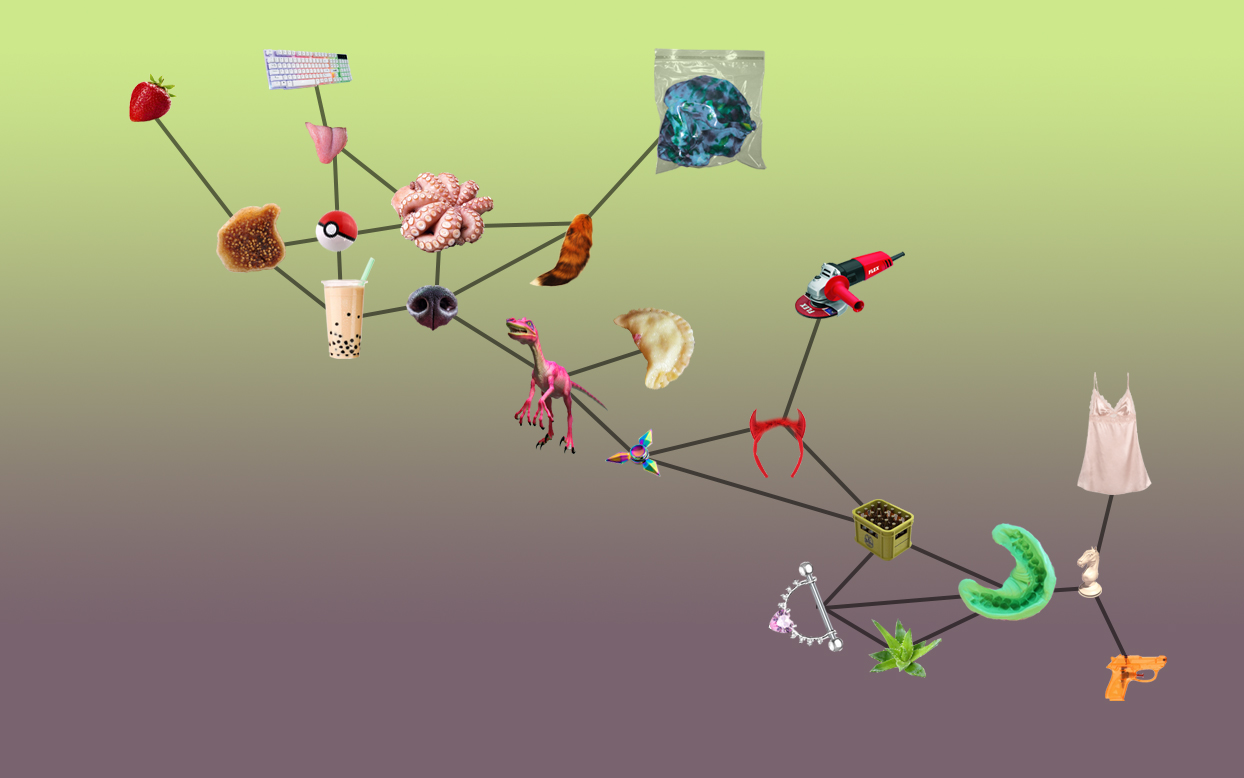
‘The commune appears as a whole that is more than the mere sum of its parts. The communal as the coming together, not being together, but a unification made up of independent subjects.’
– Fred Moten in ‘Collective Head’, Women and Performance 26, no. 2–3
Topologies of Touch invites you to meet divergent approaches to production that have been affected, conditioned, and touched on many levels by different factors orbiting around time and space: understanding time as a closed curved surface and our bodies as spaces gravitating within that surface, dreamlike and real at the same time. Touched by our experience this year, we invite you to cool down from the heat of Athens and to improvise your way through a space where different texts have been translated and published in public manifestations. We attempt to give space to another temporality and way of coming together, physically and mentally.
Study group Topologies of Touch
Florian Göttke, Marianna Maruyama, Jorinde Seijdel and students Alejandro Cerón, Anja Khersonska, Mónica Lacerda, Pitchaya Ngamcharoen, Aldo Ramos, Jasmin Schädler and Ines Schärer. Partner: Open!
Location details
The event starts at 15:00 h on Friday 1 June at Circuits & Currents project space in the Athens School of Fine Arts. Mónica Lacerda’s workshop Queer Dreams will take place in the Athens Museum of Queer Art on Thursday 31 May at 19:30 h.
Circuits & Currents project space, Athens School of Fine Arts, Navarchou Notara and Tositsa 13, 106 83 Athens, Greece and Athens Museum of Queer Art, Erigonis 3, 118 54 Athens, Greece.
Conference-festival
Hold Me Now
Feel and Touch in Unreal World
March 21, 2018 10:30 – March 24, 2018 17:30Stedelijk Museum Amsterdam
Studium Generale Rietveld Academie presents a four-days conference-festival guest curated by Karen Archey, Mark Paterson, Rizvana Bradley and Jack Halberstam, who will each inaugurate a discursive and performative programme on how the haptic – relating to or based on touch – is thought and experienced artistically, philosophically, and politically in life, art and design, and theory. Simultaneously Rietveld Uncut presents projects by departments and individual students in relation to the theoretic framework of Studium Generale. Students from the DAI / Open! Coop Academy Topologies of Touch Group will publish comments and reviews on part of the conference at the Blog-section of Open!
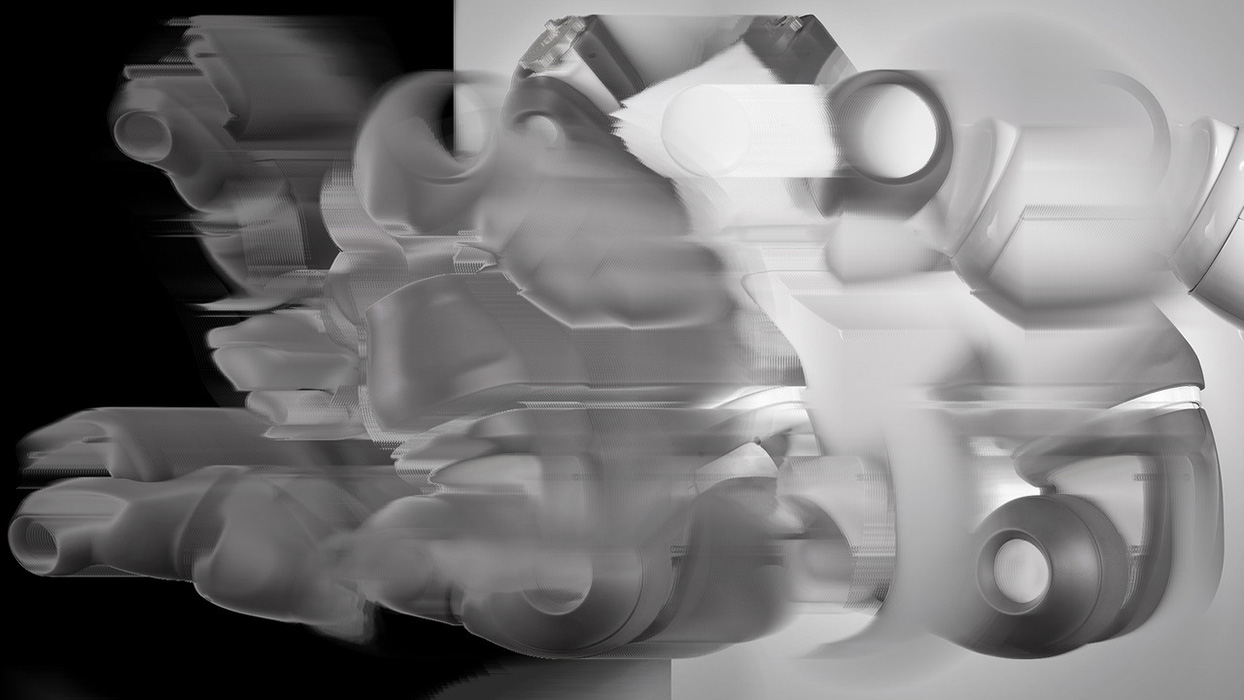
How do we feel and more specifically touch in our technologically mediated dematerialized digital cultures? Do we solely stroke and swipe our screens? How are the body and its feel involved? Are we in fact cultivating different tactilities in relation to the world and others? Further, how can we trace the ways in which touch informs and reforms the body with respect to violence, gender, sexuality, democracy, and identity? If art and design have privileged sight and sound, should touch – and all the senses – be addressed and activated in order to help us stay ‘in touch’ with our bodies and the material world?
Talks, screenings, performances
Karen Archey, Mirthe Berentsen, Jesse Darling, Joseph Grigely, Carolyn Lazard, Luke Willis Thompson, Mark Paterson, Kate Elswit, Anna Harris, Carey Jewitt, David Parisi, Stahl Stenslie, Rizvana Bradley, Hortense Spillers, Eyal Weizman, Aracelis Girmay, Erin Manning, Ligia Lewis, Wu Tsang, Lynette Yiadom-Boakye, Jack Halberstam, Karen Barad, boychild, Julia Bryan-Wilson, Mel Y. Chen, Paul B. Preciado, Jeanne Vaccaro.
Further information on the programme on the website: holdmenow.rietveldacademie.nl.
Tickets
Entrance for students and staff from Gerrit Rietveld Academie and Sandberg Instituut is free. All students and staff are welcome. Interested people from outside the Rietveld are also welcome. Students and staff are kindly asked to show their student / staff card at the Hold Me Now Front Desk (Stedelijk Museum main entrance) upon arrival to receive a day-wristband (a different wristband for each day). Day-wristbands grand you access to the conference-festival day programme and the Rietveld Uncut exhibition.
Guests from outside the Rietveld are welcome to purchase a day ticket from the Stedelijk Museum website or directly at the Stedelijk Museum counters during the conference (limited seats available). Price: EUR 3 (including museum entrance fee and access to the Rietveld Uncut exhibition).
Important notice: Attendees are kindly advised to arrive at the beginning of each days conference or during breaks so as to secure a comfortable seat and not disturb the presentations.
Stedelijk Museum Amsterdam, Museumplein 10, 1071 DJ Amsterdam, the Netherlands, www.stedelijk.nl.
Public seminar
Pricing Time: Remarks on the Ontology of Finance
A public seminar by Beirut based philosopher Ray Brassier moderated by Bassam el Baroni
June 23, 2017 19:00Huis Oostpool, Arnhem
With this seminar Open! partner DAI MA Art Praxis inaugurates APRiCot phase 2, an advanced platform for DAI’s Associate PhD Research Collective and its distinguished guests. APRiCot irregularly opens up to DAI’s master students and to other interested audiences. For live coverage of the event, please go to the Open! Blog where DAI's associate PhD researcher David Maroto will share his first impressions and notes with you.
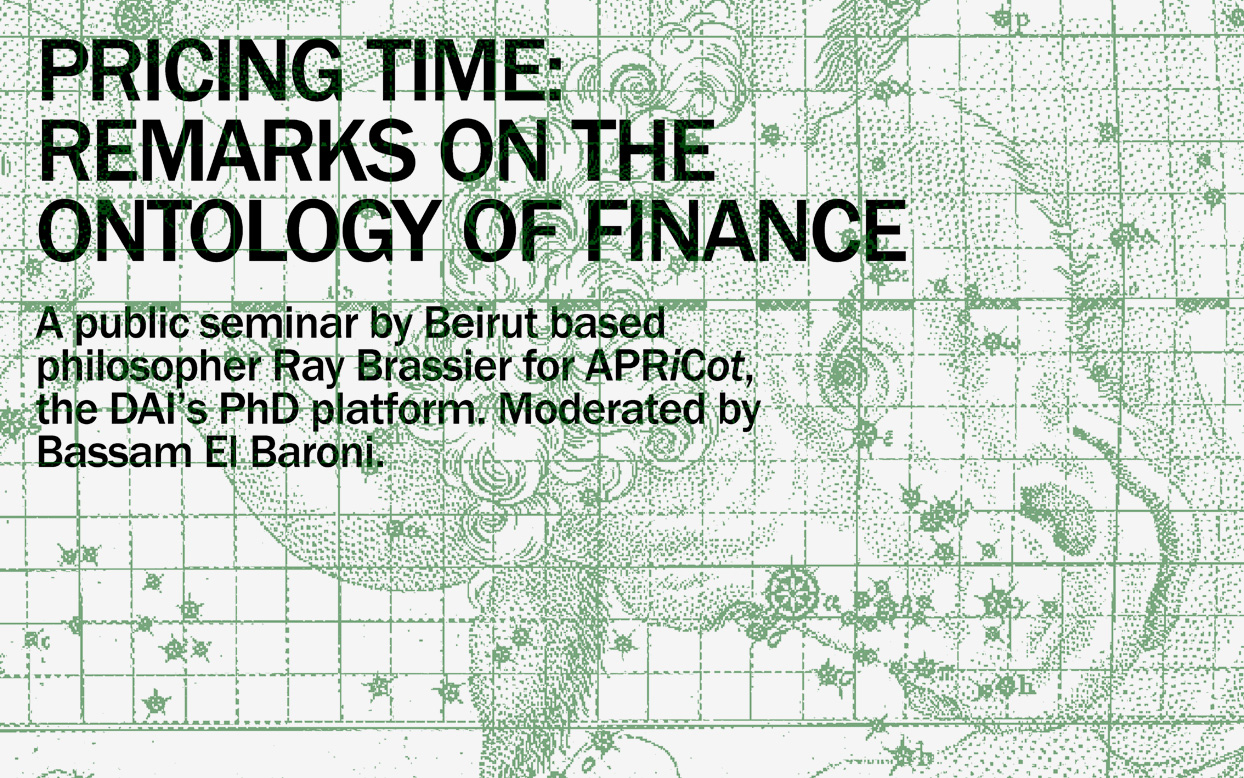
Suhail Malik’s 2014 paper, ‘The Ontology of Finance’, challenges orthodox Marxian accounts of the connection between capitalism, finance, and politics. Drawing on Nitzan and Bichler’s Capital as Power, Malik argues that capital accumulation is not propelled by self-valorizing value but by the differential logic of pricing. In Malik’s words, “administered prices make explicit that price is the medium of capital accumulation qua power-ordering.” In finance capital, price becomes an abstract variable independent of its incarnation in concrete assets: it is no longer a measure of value, only of itself. Thus, Malik argues, financialization is not a species of capitalization; rather, capitalization is a species of financialization. Since the logic of pricing involves a binding of time, it is through pricing as time-binding that capital exerts social power. But capital’s time-binding power cannot be challenged by resorting to extant models of political action: collective human agency does not offer a credible counter-power against the power-ordering exerted by pricing. Since derivatives markets are the medium of pricing, the suggestion seems to be that financial speculation is the proper medium in which to countermand capitalism’s power. This seminar will examine the key moves in Malik’s argument and critically appraise its political ramifications.
Speakers
Ray Brassier, Bassam el Baroni.
Tickets
Free entry.
Huis Oostpool, Nieuwstraat 58, 6811 HX Arnhem, the Netherlands, www.toneelgroepoostpool.nl. Organised in collaboration with: Walter Books in Arnhem and HEAD CCC Research in Geneva.
Public event
Becoming More
May 18, 2017 – May 28, 2017Van Abbemuseum, Eindhoven
Open! COOP Academy Publishing Class – Open!’s course at DAI MA Art Praxis – is participating in Becoming More, a ten-day caucus comprising lectures, performances, screenings, commissions, discussions and food hosted by the Van Abbemuseum, Eindhoven. Together with art critic and editor Federica Bueti participants of Open! COOP Academy Publishing Class will form a temporary editorial office and do live coverage of the public programme on May 19–21. Their writing will be published on the new Open! Blog.
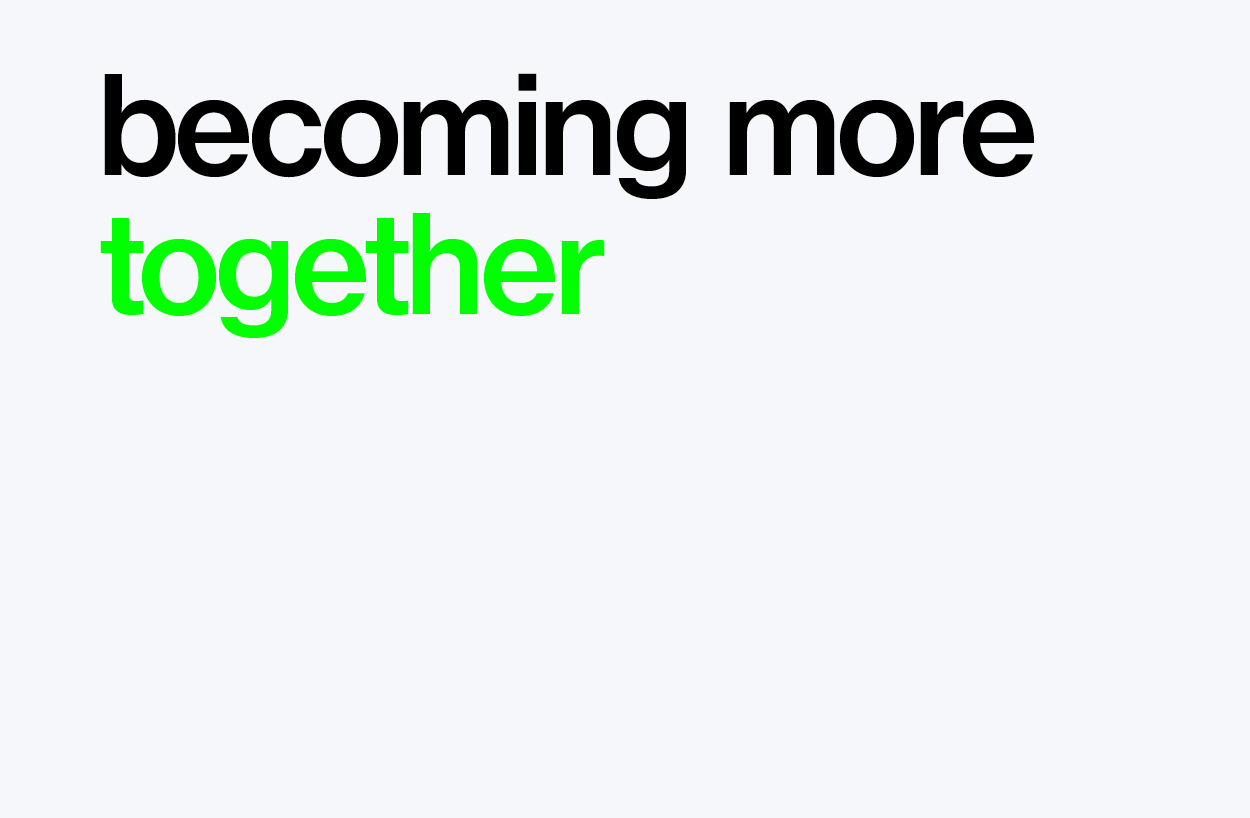
On the 10th anniversary of the research and exhibition project Be(com)ing Dutch it is time to convene again – to come together to strengthen existing alliances and to develop new affinities. How can art provide a productive, critical space where solidarities are formed and political visions rehearsed? In other words: ‘how can we become more?’
For Becoming More, the Van Abbemuseum invited artists, organizers and thinkers working in the Netherlands to author distinct days, bringing different forms of knowledge and experiences into the museum. At this critical juncture of unrest, it is vital to listen, consolidate and share. The programme is the outcome of these extensive discussions from which a series of urgent topics have emerged.
Participants
Karin Amatmoekrim, Jabu Arnell, Amandla Awethu, Raul Balai, Markus Balkenhol, Richard Bell, Zach Blas, Sara Blokland, Jelle Bouwhuis, Ricardo Burgzorg, Sinan Cankaya, Binna Choi, Ernestine Comvalius, Jessica de Abreu, Mariette Dolle, Diedrich Diederichsen, Bassam el Baroni, Mitchell Esajas, Kodwo Eshun, Paul Faber, Chandra Frank, Quincy Gario, Susan Gibb, Ozkan Golpinar, Paul Goodwin, Florian Göttke, Antonio Guzman, Nancy Hoffman, Nancy Jouwe, Guno Jones, Remy Jungerman, Navine Khan Dossos, Yuki Kihara, Patricia Kaersenhout, Maurizio Lazzarato, Imara Limon, Silvia Maglioni & Graeme Thomson, Michael Marder, Marian Markelo, Doreen Mende, Jon Mikel Euba, Wayne Modest, Ruth Noack, Rachel O’Reilly, Rob Perree, Sarah Pierce, Josien Pieterse, Andre Reeder, Resistance is Fertile, Alejandra Riera, Gabriëlle Schleijpen, Jorinde Seijdel, Kerstin Stakemeier, The Umbrella network, Untold, Yolande van der Heide, Els van der Plas, Ferdinand van Dieten, Martijn van Nieuwenhuyzen, Vincent van Velsen, Aruna Vermeulen, Marina Vishmidt, McKenzie Wark, Gloria Wekker, Marga Weimans, Simone Zeefuik, Vivian Ziherl and Tirdad Zolghadr.
Van Abbemuseum, Bilderdijklaan 10, Eindhoven, the Netherlands, www.vanabbemuseum.nl. Tickets: www.vanabbemuseum.nl.
Public event
Technology / Affect / Space #2
Designing Affect Space
May 20, 2016 13:30Het Nieuwe Instituut, Rotterdam
Open! the online platform for art, culture and the public domain has launched a public research trajectory into the dynamics of this recurrent pattern, following up on the essay ‘Affect Space’ written for Open! by media theorist and researcher Eric Kluitenberg (2015). Three public discussions and research meetings have been convened with our partners the MIT ACT (Art, Culture, Technology) program in Cambridge (Massachusetts), LAPS Research Institute in Art and Public Space in Amsterdam, and Het Nieuwe Instituut in Rotterdam to explore these dynamics. In parallel to these public meetings a series of six commissioned essays will be published on the Open! platform in the coming months.
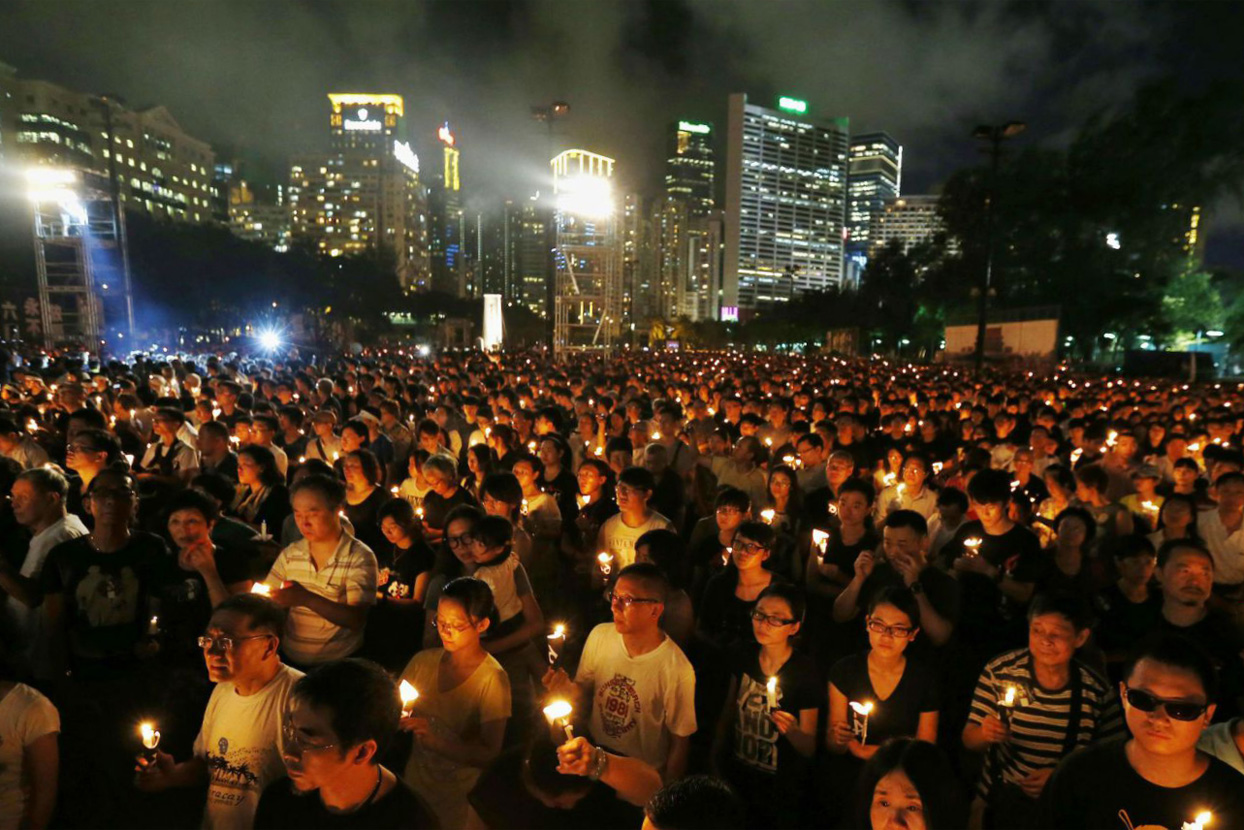
In recent years a new pattern of mobilisation has emerged in urban space. Massive gatherings of crowds appear as quickly as they dissolve. The mobilisation starts online via the internet, charges with affective intensity, and spills out into public space – the places where people want to meet. But public space itself is filled with mobile media (smart phones) and wireless networks (3G, 4G, WiFi) so that the ‘action on the street’ is immediately recorded and sent back into the media network. In this way small incidents can transform quickly into massive events.
In this meeting we will explore the role of affective exchanges in urban public spaces and the ways in which mobile and wireless technologies reinforce and amplify these exchanges. Next we will examine the ways in which ‘affective data’ are extracted from the urban environment, as evidenced in for instance the City Pulse research project of Atos and the Living Laboratory pilot project currently undertaken by the city of Eindhoven, to monitor the leisure district Stratumseind in real-time, while simultaneously analysing social media feeds to detect ‘mood-changes’. The overall aim is to question what the role of (spatial) design disciplines can be in these complex and highly volatile spaces, which are both massive and ephemeral at the same time.
Speakers
Rodrigo Delso Gutiérrez (architect and researcher, Madrid); Michael Buser (geographer, University of the West of England); Linnet Taylor (researcher, University of Amsterdam); Albert Seubers (director Global Strategy IT in Cities, Atos); Marcel Schouwenaar (The Incredible Machine / Internet of Things Design Manifesto, Rotterdam); Michiel de Lange (researcher Utrecht University); Martijn de Waal (researcher University of Amsterdam) and Eric Kluitenberg (moderator).
Tickets
Free entrance.
Het Nieuwe Instituut, Museumpark 25, 3015 CB Rotterdam, the Netherlands, www.hetnieuweinstituut.nl.
Public event
Technology / Affect / Space #1
Mapping Affect Space
April 22, 2016; 14:00 – 18:00De Balie, Amsterdam
Following up on the essay ‘Affect Space’ written for Open! by media theorist and researcher Eric Kluitenberg early 2015, Open! together with LAPS, the MIT ACT Art Culture and Technology program in Boston, and Het Nieuwe Instituut in Rotterdam has launched a public research trajectory to explore these dynamics beyond the protest gatherings themselves.
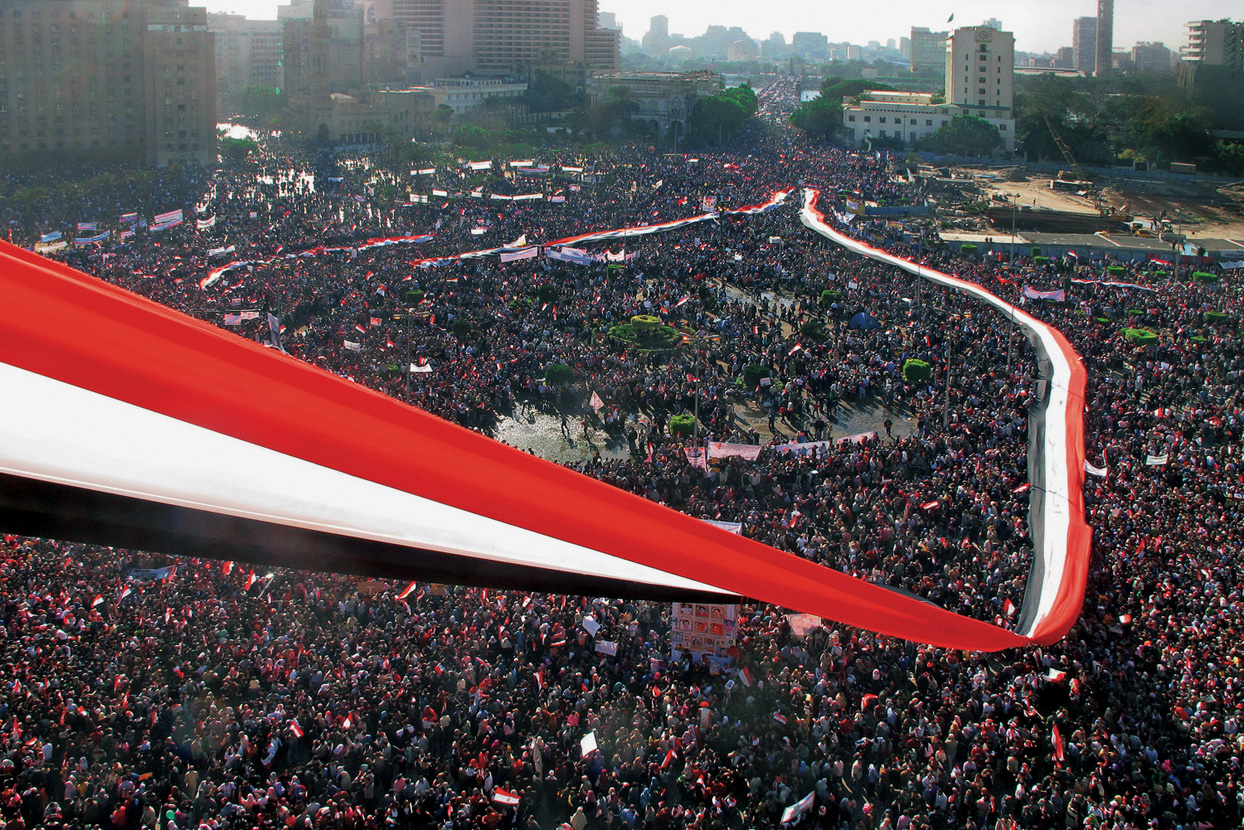
Since 2011 we have witnessed a recurrent global media spectacle where massive protest gatherings in public space seem to emerge from out of nowhere, accompanied by an avalanche of self-produced media mostly distributed over the Internet. From Puerta del Sol in Madrid to the streets of Istanbul, Ferguson, Haren and Paris (Je (ne) Suis (pas) Charlie), this recurrent spectacle appears across vastly different contexts and around a wide variety of issues. The pattern we see in these gatherings remains remarkably constant: Affectively highly charged mobilisations via the Internet spill over into public space, but because this public space is awash with mobile media and wireless networks, the ‘action in the street’ immediately feeds back into the media network. How do we understand and engage with these massive ephemeral events and the techno-social dynamics producing them?
In this meeting we discuss how the emergent techno-sensuous spatial order of Affect Space can be mapped using the very technologies that produce these new dynamics. We also question how the body is situated in these dense spaces as both an affective receptor and amplifier? The discussion is followed by a public program organised in co-operation with Het Nieuwe Instituut in Rotterdam on Friday May 20 around the question ‘How to design Affect Space?’.
Speakers
Christian Nold, artist designer (Emotional Cartography); artists Esther Polak / Ivar van Bekkum; choreographer and media researcher Susan Kozel; cultural and media theorist Nishant Sha; performance artist Arthur Elsenaar; Jeroen Boomgaard (LAPS), and Eric Kluitenberg.
Tickets
Prices regular: EUR 7,50; students EUR 2,50. Reservations via +31 20 553 51 00. Buy tickets.
De Balie, Kleine Gartmanplantsoen 10, 1017 RR Amsterdam, the Netherlands, www.debalie.nl.